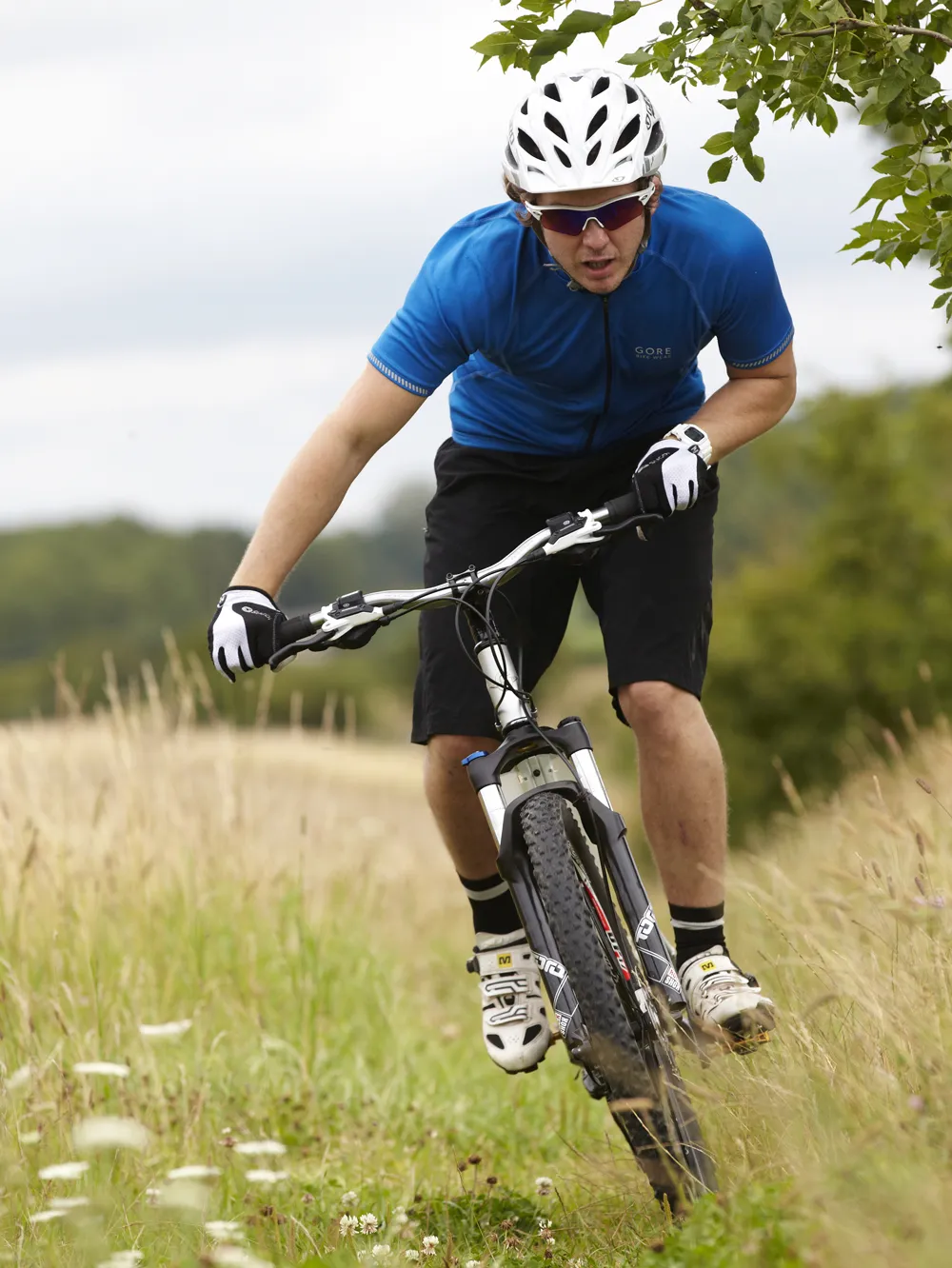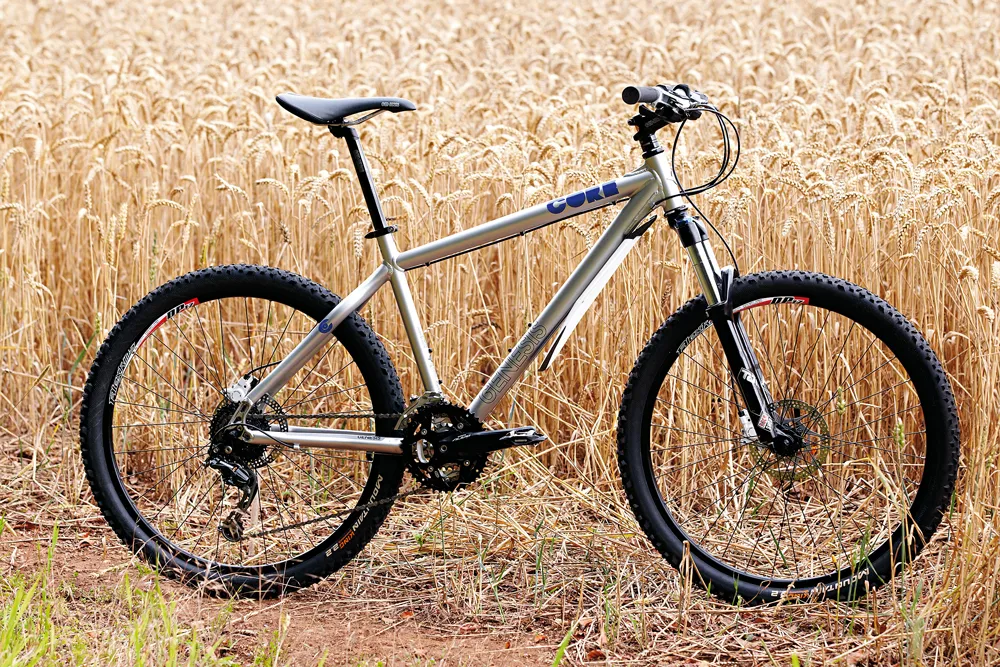Genesis have built a solid reputation for well-designed and equipped bikes in a relatively short time. A lot of that reputation is based on their well-regarded but slightly niche steel hardtails, but Genesis also have the mainstream-friendly aluminium Core range – same geometry, but a little cheaper.
The 20 is second from bottom in the range. On paper it doesn't look all that compelling, particularly as it's a pound or two heavier than many other bikes at this price. But some of that extra heft goes into a sturdier fork. Mix that with a fun, chuckable ride and solid spec elsewhere and the Genesis wins you over with its sheer joie de vivre.
Ride & handling: Long-forked, low-slung trail hardtail with grin-a-minute handling
Genesis have nailed their colours firmly to the ‘trail hardtail’ mast with the Core 20. It’s the classic UK-style long-forked hardtail and as such is a fun, versatile bike. The Core weighs nearly 30lb but you wouldn’t know to ride it. The light wheels and reasonably fast-rolling tyres make for plenty of get-up-and-go, while the handling virtually insists that you chuck the Genesis around a bit – it’s a hoot on all sorts of trails.
The RockShox Tora fork is definitely a bonus at this price. It’s an entry-level fork but it’s stout and effective (if you ignore the gasping noises). On a bike like the Core, which encourages a direct approach, a robust fork is a valuable ally. It’s certainly worth sacrificing a notch of groupset hierarchy for, and it’s not as if the Core’s Shimano Alivio kit is noticeably less smooth than Deore anyway.
If you’re a fan of the race-style bike then the Genesis may not suit you, and on paper there’s better value to be had elsewhere. But the Core is great fun to ride. Upgrade the transmission bits as they wear out and you’ll be set for a long time to come.
Frame: Clean, gimmick-free chassis with stiff wishbone-style back end
While most of the bike industry have gone hydroforming mad, Genesis have played it straight with the Core frame. Front-end tube manipulations are limited to a bit of gentle ovalising and tapering, which is fine by us – there’s not much wrong with a good old round tube. The Core’s 6061 pipes are butted, and Genesis uses different wall thicknesses and butting profiles on different sizes.
Tidy open-ended gussets add strength to the front end. The head tube’s also something of an anti-fashion statement, taking a conventional headset rather than the now-commonplace semi-integrated design. Again, no complaints from us there. Bosses for a Crud Catcher-style mudguard lurk under the down tube, and the test bike arrived with a Cycraguard mudguard already mounted. A forward-facing seat clamp slot is another mud-friendly feature.
The back end of the Core frame contains its most distinctive features. The stays are triangular in section, presenting a flat face towards the tyre for maximum tyre clearance – there’s plenty of room around the 2.2in treads fitted. They’re also gently curved, with the top of the seatstays being welded together to form a wishbone arrangement.
There are theoretical stiffness benefits to this design, but the fact that it looks good is perhaps at least as significant. Cables are routed traditionally, with the brake hose along the top tube and gear cables taking the most direct route under the down tube.
Equipment: Alivio parts are a step down from the competition but fork and wheels make up for it
On paper, most of the stuff bolted to the Core is a notch (or two) down from that found on other bikes at this price. But Genesis have done exactly what much of the competition would benefit from – they’ve put most of the component budget into the important stuff, such as a better fork and wheel package, and the transmission parts (which wear out and get replaced anyway) get whatever cash is left over.
So it’s mostly Shimano Alivio in the transmission department (although the rear mech gets a bump to Deore), but in return you get a coil-sprung RockShox Tora fork that’s a substantial step up from the cheaper Dart. The Tora’s better chassis stiffness means less binding. The TurnKey damping circuit is on the noisy side, but it works and you get a lockout.
Reliable Shimano hubs are laced to Alex rims and shod with Continental Mountain King 2.2 tyres. The Mountain Kings roll fast and offer a decent amount of cushioning, but the tread favours firm/intermediate conditions and can get a bit sketchy on wet ground.
Ever-reliable Shimano M445 brakes bring things to a controlled halt and offer good feel and plenty of control, if not tons of stopping power. The finishing kit is all Genesis-branded stuff that does the job, with a suitably on-trend short stem/wide bar combo and a 27.2mm seatpost for a hint of bum-saving flex.

This article was originally published in Mountain Biking UK magazine.
